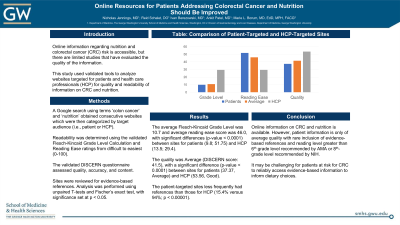Sunday Poster Session
Category: Colorectal Cancer Prevention
P0420 - Websites for Patients that Address Colorectal Cancer and Nutrition Should be Improved
Sunday, October 27, 2024
3:30 PM - 7:00 PM ET
Location: Exhibit Hall E

Has Audio
- NJ
Nicholas Jennings, MD
George Washington University School of Medicine and Health Sciences
Washington, DC
Presenting Author(s)
Nicholas Jennings, MD, Reid Schalet, MD, Ivan Berezowski, MD, Marie L.. Borum, MD, MPH, FACG
George Washington University School of Medicine and Health Sciences, Washington, DC
Introduction: Research on nutrition and colorectal cancer (CRC) has identified dietary patterns that may influence carcinogenic risk. Online information regarding nutrition and CRC risk is accessible, but there are limited studies that have evaluated the quality of the information. This study used validated tools to analyze websites targeted for patients and health care professionals (HCP) for quality and readability of information on CRC and nutrition.
Methods: A Google search using terms ‘colon cancer’ and ‘nutrition’ obtained consecutive websites which were then categorized by target audience (i.e., patient or HCP) and further classified based on information type: academic, informational or non-academic, news articles, blogs, or advertisements. Sites were excluded if in video form, were advertisements, or pertained to nutrition after CRC diagnosis or surgery. Readability was determined using the validated Flesch-Kincaid Grade Level Calculation and Reading Ease ratings from difficult to easiest (0-100). The validated DISCERN questionnaire assessed quality, accuracy, and content [Ratings: Excellent (66-80), Very Good (56-65), Good (46-55), Average (36-45), or Poor (< 35)]. Sites were reviewed for evidence-based references. Analysis was performed using unpaired T-tests and Fischer’s exact test, with significance set at p < 0.05.
Results: 100 consecutive sites were obtained with 30 excluded. 52 sites targeted patients and 18 targeted HCP. Of the 70 analyzed: 16 were academic, 23 informational, 20 news articles, 11 blogs. The average Flesch-Kincaid Grade Level was 10.7 and average reading ease score was 46.0, with significant differences (p-value < 0.0001) between sites for patients (9.8; 51.75) and HCP (13.5; 29.4). The quality was Average (DISCERN score: 41.5), with a significant difference (p-value < 0.0001) between sites for patients (37.37, Average) and HCP (53.56, Good). The patient-targeted sites less frequently had references than those for HCP (15.4% versus 94%; p < 0.00001).
Discussion: Online information on CRC and nutrition is available. However, patient information is only of average quality with rare inclusion of evidence-based references and reading level greater than 6th grade level recommended by AMA or 8th-grade level recommended by NIH. It may be challenging for patients at risk for CRC to reliably access evidence-based information to inform dietary choices. HCP must be aware of the limitations of on-line information and be able to direct their patients to appropriate resources.
Disclosures:
Nicholas Jennings, MD, Reid Schalet, MD, Ivan Berezowski, MD, Marie L.. Borum, MD, MPH, FACG. P0420 - Websites for Patients that Address Colorectal Cancer and Nutrition Should be Improved, ACG 2024 Annual Scientific Meeting Abstracts. Philadelphia, PA: American College of Gastroenterology.
George Washington University School of Medicine and Health Sciences, Washington, DC
Introduction: Research on nutrition and colorectal cancer (CRC) has identified dietary patterns that may influence carcinogenic risk. Online information regarding nutrition and CRC risk is accessible, but there are limited studies that have evaluated the quality of the information. This study used validated tools to analyze websites targeted for patients and health care professionals (HCP) for quality and readability of information on CRC and nutrition.
Methods: A Google search using terms ‘colon cancer’ and ‘nutrition’ obtained consecutive websites which were then categorized by target audience (i.e., patient or HCP) and further classified based on information type: academic, informational or non-academic, news articles, blogs, or advertisements. Sites were excluded if in video form, were advertisements, or pertained to nutrition after CRC diagnosis or surgery. Readability was determined using the validated Flesch-Kincaid Grade Level Calculation and Reading Ease ratings from difficult to easiest (0-100). The validated DISCERN questionnaire assessed quality, accuracy, and content [Ratings: Excellent (66-80), Very Good (56-65), Good (46-55), Average (36-45), or Poor (< 35)]. Sites were reviewed for evidence-based references. Analysis was performed using unpaired T-tests and Fischer’s exact test, with significance set at p < 0.05.
Results: 100 consecutive sites were obtained with 30 excluded. 52 sites targeted patients and 18 targeted HCP. Of the 70 analyzed: 16 were academic, 23 informational, 20 news articles, 11 blogs. The average Flesch-Kincaid Grade Level was 10.7 and average reading ease score was 46.0, with significant differences (p-value < 0.0001) between sites for patients (9.8; 51.75) and HCP (13.5; 29.4). The quality was Average (DISCERN score: 41.5), with a significant difference (p-value < 0.0001) between sites for patients (37.37, Average) and HCP (53.56, Good). The patient-targeted sites less frequently had references than those for HCP (15.4% versus 94%; p < 0.00001).
Discussion: Online information on CRC and nutrition is available. However, patient information is only of average quality with rare inclusion of evidence-based references and reading level greater than 6th grade level recommended by AMA or 8th-grade level recommended by NIH. It may be challenging for patients at risk for CRC to reliably access evidence-based information to inform dietary choices. HCP must be aware of the limitations of on-line information and be able to direct their patients to appropriate resources.
Disclosures:
Nicholas Jennings indicated no relevant financial relationships.
Reid Schalet indicated no relevant financial relationships.
Ivan Berezowski indicated no relevant financial relationships.
Marie Borum: Takeda Pharmaceuticals – Consultant, Speakers Bureau.
Nicholas Jennings, MD, Reid Schalet, MD, Ivan Berezowski, MD, Marie L.. Borum, MD, MPH, FACG. P0420 - Websites for Patients that Address Colorectal Cancer and Nutrition Should be Improved, ACG 2024 Annual Scientific Meeting Abstracts. Philadelphia, PA: American College of Gastroenterology.
